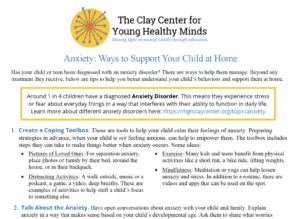CBT Snapshot: Using Cognitive Behavior Therapy for Anxiety Disorders

Posted in: Grade School, Parenting Concerns, Teenagers
Topics: Anxiety, Mental Illness + Psychiatric Disorders
Cognitive Behavioral Therapy (CBT) is a special kind of talk therapy that can be used to help with mental health challenges. In this CBT Snapshot series, Dr. Ellen Braaten gives a glimpse of what it looks like to use CBT for a range of mental and behavioral health disorders.
Hillary was a 10th-grade student who constantly complained that she had trouble sleeping at night. She was an exceptionally strong student, but she tended to stay up writing and rewriting her homework and class notes. Once she finally went to bed (sometimes as late as 2 a.m.), she had trouble “shutting [her] mind down.” Although she was only in 10th grade, she had already started to worry about the college admission process. The worry caused her to have migraines and backaches. When she began having difficulty concentrating, she started to worry that her schoolwork was going to suffer. Her mother was also concerned and contacted Hillary’s pediatrician, who referred her to a Cognitive Behavior Therapist.
CBT for anxiety has been found to be quite effective. Hillary’s treatment focused on a number of different areas:
- Hillary’s therapist used a technique caused cognitive restructuring, which helped Hillary look at her schoolwork and future college applications as less threatening. This made her more like to actually do the applications as opposed to worrying about doing the applications.
- Training in relaxation and imagery was an important component of treatment. Hillary learned how to recognize the early signals of anxiety and use relaxation methods to stop the cycle.
- Hillary and her therapist discussed more adaptive ways of coping with her schoolwork. For example, did Hillary need to recopy her notes? Was it vital that she hand in the perfect paper every time? What would happen if she received a B+ or A- once in a while?
Hillary made very good progress with CBT treatment and, although she initially refused medication, after a few weeks without making much progress, she decided to try a medication to make her “feel less uptight.” Within several weeks of starting Luvox, Hillary was feeling calmer and more confident. She found the therapy quite effective and within three months was falling asleep with little difficulty, reporting few headaches, and was much less anxious about her grades.


 Share
Share Tweet
Tweet





